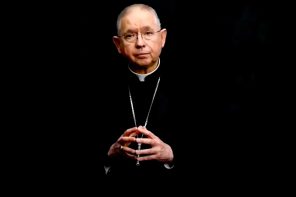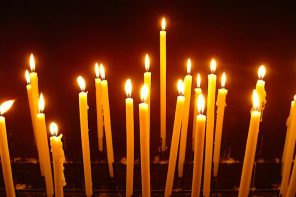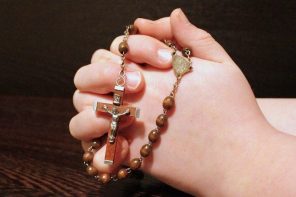There’s obvious political motive to the new round of Catholic lawsuits against the Obama administration. Michael Gerson argues in the Washington Post today that President Obama risks losing the Catholic vote—although he fails to establish contraception is the reason Obama’s standing among Catholic voters has declined since 2008, according to some polls. Gerson ties the new Catholic litigation effort, and the political context, to the Bishops’ planned “Fortnight for Freedom,” and at the end quotes St. Thomas More: “I die the king’s faithful servant, but God’s first.”
The Bishops have called on Catholics to commemorate Catholic saints and martyrs as part of this religious freedom campaign. But as a broader political or public relations strategy, invoking More as a symbol of religious freedom is highly problematic, for some of the Bishops’ evangelical allies, but especially for how citizens understand our democracy.
More, politician, philosopher, counselor to King Henry VIII and later his Lord Chancellor, opposed the Reformation—not just Martin Luther, not just Henry’s efforts to secure a divorce from Rome, but the contemporaneous efforts of William Tyndale to publish and distribute an English translation of the Bible in England. His pursued Tyndale with an inquisitorial zeal, and Tyndale eventually was burned at the stake. More’s own martyrdom stems from his beheading, charged by Henry with treason because of his loyalty to Rome, and refusal, after his retirement from public life, to swear an oath to the Act of Succession, which rejected papal authority.
More, canonized in the 20th century and viewed by Catholics as the defender of conscience, is hardly viewed as a saint by some of the Bishops’ erstwhile political allies. The evangelical homeschooling advocate and lawyer, and founder of Patrick Henry College (aka “God’s Harvard“), Michael Farris, wrote a book highly critical of More’s abuse of Tyndale, whom he portrayed as the forerunner of American religious liberty.
In fictionalized tellings, the image of the saintly More (“a man for all seasons”) was called into question by Hilary Mantel’s fabulous, award-winning 2009 historical novel Wolf Hall. In the garish, scenery-chewing Showtime series, The Tudors, More, portrayed by Jeremy Northam, is shown only barely wincing as he watches the skin of one of his accused heretics start to sizzle at the stake.
Here in the United States, More’s legacy as a defender of religious freedom is sullied by the Michigan-based law firm which bears his name. The Thomas More Law Center recently appointed noted Islamophobe Rep. Allen West to its Citizens Advisory Board. In accepting the post, West said, “What impressed me about the Law Center is that it knows the true threat to our nation posed by radical Islam and it has initiated and funded more cases challenging the Stealth Jihad being waged against our Nation than any other public interest law firm in America.”
In the coming weeks, as the Fortnight for Freedom approaches, expect More’s name to be invoked again and again, and his martyrdom compared with, supposedly, that of 21st century American Catholics, who live in a modern democracy, not a 16th century monarchy. Yet in this depiction—wait for it—the Obama administration is like Henry VIII, attempting to require loyalty to the Church of England (or the Department of Health and Human Services) rather than the Vatican.
Fr. Paul Scalia, pastor of St. John the Beloved Parish in McLean, Virginia, writing in the Catholic Herald last month, implored Catholics to mimic More in response to the Obama administration (emphasis mine):
Just as in St. Thomas’s day it was a moral issue that precipitated the larger crisis, so also in our day. The Church’s teaching on contraception is at the core of this crisis. We can — and should — say many things about this teaching. It is one of the most important, challenging and beautiful of the Church’s doctrines. But the teaching itself — as important as it is — really just occasions another, broader issue. The crisis now before us between the bishops and the administration turns on the rights of the Church and the rights of man: the Church’s right of self-governance and the rights of individual conscience.
Henry VIII redefined the Church in England. It is not too much to say that by the HHS mandate, the administration seeks to do likewise in the United States. Cardinal Timothy Dolan, archbishop of New York, asks the question: Can a government bureau define for us or any faith community what is ministry and how it can be exercised? Of course not. The Church has the right to define herself and not be told by outside authorities what does or does not define her work.
Well, yes, it is too much to say that, in so many ways. The United States government, unlike Henry’s England, is not under the religious authority of Rome, or any religious body, for that matter. (That’s in the Constitution, last time I checked.) Through the contraception mandate, or any other duly enacted law or regulation, such as the repeal of Don’t Ask Don’t Tell, the United States government is not flouting religious authority. That’s because it doesn’t answer to religious authority, like monarchs did in 16th century England. The United States is a democracy, an experiment born of events and ideas that took place long after Henry ordered More beheaded; of events and ideas that explicitly reject the notion of either monarchical or religious absolutism; and which protects Americans of all religious faiths from More’s (or Tyndale’s) fate. (The Bishops apparently don’t like these events, or misapprehend them and their relationship to American democracy. The Archbishop of Miami, Thomas Wenski, recently said that “efforts to restrict religious liberty are seemingly founded in a reductive secularism that has more in common with the French Revolution than with America’s founding.”)
The very idea that providing women with insurance coverage is somehow tantamount to the terror and violence inflicted on both sides in Reformation England—or to the historical cataclysm that was Henry’s schism from Rome—is so absurd I’m stunned as my fingers tap across my keyboard. If we’re going to spend the next five and half months discussing whether Barack Obama is like Henry VIII, well, God help us.




